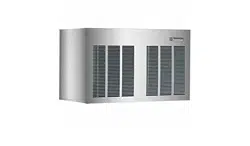Loading ...
Loading ...
Loading ...

START UP
Pre-Start Inspection
1. Remove the front and side service panels.
2. Check that any shipping blocks have been
removed.
3. Inspect the interior of the machine for loose
screws or wires. Check that no refrigerant lines
are rubbing each other. Check that the fan blade
turns freely (air cooled).
4. Check that the unit is installed correctly
according to the final check list (page 8).
Start Up
1. Go through the prestart inspection.
2. Open the hand valve, observe that water enters
the water reservoir, fills the tube from the reservoir
to the evaporator, and then shuts off. Check for
leaks.
3. Switch the master switch on.
The electrical start up sequence is automatic.
There will be a short (15 second) delay before the
gear motor and compressor start.
4. Air cooled models will begin to discharge warm
air out the back of the cabinet. Water cooled
models will discharge warm water into the drain.
5. The unit will soon be making ice. If desired the
low side pressure of each system may be checked:
it should be 33 psig + or - 2 PSIG.
The suction line temperature at the compressor is
normally very cold, nearly to the point of frost up to
the compressor body, but not on it.
The air cooled discharge pressure will depend
upon air and water temperatures, but should be
between 200 psig and 280 psig.
The above numbers are for new, clean machines,
you can expect to see some values higher, and
some lower between different units.
6. THERE ARE NO ADJUSTMENTS TO MAKE,
so replace the panels.
7. Clean and/or sanitize the storage bin interior,
wipe off the exterior with a clean, damp cloth.
8. Give the owner/user the manual, instruct
him/her in the operation of the unit, and make sure
they know who to call for service.
9. Fill out the manufacturers registration and mail it
to Scotsman.
FME2404 or NME1854
January 2012
Page 9
The following procedure applies to each of the two separate ice making systems.
Loading ...
Loading ...
Loading ...
